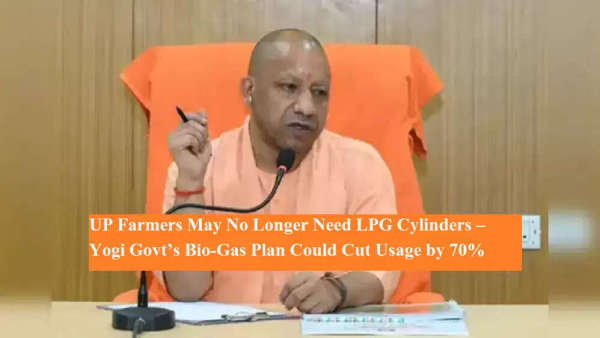
The Uttar Pradesh government is gearing up to launch a new initiative under the “Gram Urja Model” that promises to drastically reduce LPG gas consumption in rural households — especially among farmers. According to the state’s latest announcement, this innovative scheme is projected to cut LPG usage by up to 70%, making rural homes more energy-efficient and self-reliant.
Under the leadership of Chief Minister Yogi Adityanath, this new model will involve setting up bio-gas units directly at farmers’ homes or agricultural lands, enabling them to generate cooking fuel and organic fertilizer on-site.
The “Gram Urja Model” is a decentralized rural energy model that aims to empower farmers by allowing them to produce their own clean energy. Through the installation of small-scale biogas plants, households will be able to replace a large chunk of their LPG usage with eco-friendly bio-gas made from cow dung and agricultural waste.
Dr. Anurag Srivastava, OSD (Officer on Special Duty) of the Uttar Pradesh Gau Seva Aayog, stated that domestic bio-gas units will help reduce LPG usage by up to 70%. This not only leads to substantial cost savings for rural families but also supports environmental conservation.
To make this plan more accessible, the government plans to extend the model beyond public gaushalas (cow shelters) to individual farmers’ households. This includes:
Setting up bio-gas plants at the doorsteps of farmers
Enabling farmers to use dung from their own cattle for gas generation
Utilizing the slurry (residue from biogas) as a natural fertilizer for organic farming
This dual benefit — clean energy and organic fertilizer — will lower input costs in agriculture and boost overall farm productivity.
In a major boost to the plan’s execution, the MGNREGA scheme will also be linked to the Gram Urja initiative. Under this, farmers will receive assistance for constructing Individual Cattle Sheds, which will become the base for dung collection used in bio-gas units.
The slurry produced from these bio-gas units can also be sold to nearby organic farms, enabling farmers to earn additional income while reducing dependence on chemical fertilizers.
As a first step, the government is preparing to activate biogas and organic compost plants in 43 selected gaushalas across Uttar Pradesh. These plants are expected to:
Produce cooking-grade biogas
Generate an estimated 50 quintals of organic slurry per month
Supply neighboring farmers with organic manure
According to government estimates, this move will not only reduce the pressure on LPG distribution in rural areas but will also enhance the state’s push toward sustainable agriculture.
This initiative comes at a crucial time when rising LPG prices have burdened rural households. By investing in renewable, localized energy, the government aims to:
Cut household fuel costs significantly
Promote organic and sustainable farming
Reduce carbon emissions in agriculture
The model also supports the circular rural economy, where waste becomes a resource and farming becomes less dependent on external inputs.
The Gram Urja Model will gradually expand across the state. With the initial success of bio-gas units in selected gaushalas, the plan is to encourage individual adoption through subsidies, training, and integration with other rural development schemes.